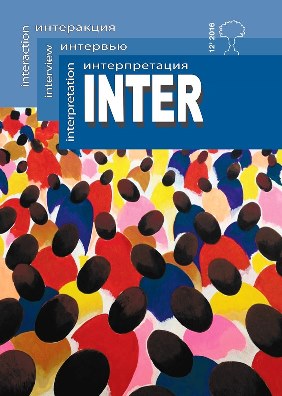«Музей истории ГУЛАГа как отражение травматического опыта»
Для цитирования
Постная Е. «Музей истории ГУЛАГа как отражение травматического опыта» // Интеракция. Интервью. Интерпретация. 2016. Том 8. № 12. С. 68-79.
Аннотация
В эссе рассматривается кейс Государственного музея истории ГУЛАГа в Москве; относящегося к категории «музеев памяти/совести». Данный тип музеев функционирует не просто с целью сохранения и передачи потомкам исторических фактов; но и переосмысления трагических страниц прошлого. Музей истории ГУЛАГа ставит перед собой задачу признать прошлое и обратиться к состраданию и пониманию посредством воссоздания «места памяти»; конструирования площадки для общественного диалога и вовлечения индивидов в общественную деятельность. Методология исследования основана на описательном кейс-стади. Полевой этап проводился с февраля по апрель 2015 г. в здании музея на ул. Петровка и включал в себя интервью; включенное наблюдение; текстовый анализ книг отзывов музея; анкетирование посетителей и волонтеров. Эмпирические данные демонстрируют разнообразие способов освоения музейного пространства посетителями: были выявлены такие значимые социальные практики; как «edutainment» - образование с помощью интерактивных технологий и «машина времени» - возможность испытать аутентичный опыт репрессированных и перенестись в «другую реальность». Музей посещают разнообразные группы индивидов – профессиональные исследователи; молодежь; родственники репрессированных; иностранцы и случайные посетители; воспринимающие музей в различных контекстах. Музей ГУЛАГа выступает в качестве противоречивого объекта; функционирующего в публичной и приватной сферах; где одновременно происходят получение знаний с помощью интерактивных практик; активная дискуссионная коммуникация акторов и сакрализация тематики репрессий. Занимая нишу «музеев памяти/совести»; музей ставит перед собой задачу актуализировать тематику памяти о советских репрессиях в современном российском обществе.
Ключевые слова:
музей ГУЛАГа, музей памяти, музей совести, репрессии, память, edutainment
Литература
Гнедовский М. Старые и новые исторические музеи. Панорама мемориальных музеев («музеев совести») // Уроки истории XX век. 2010. 7 октября. URL: http://urokiistorii.ru/memory/place/1194 (дата обращения: 28.01.2015).
Живая книга памяти // Музей истории ГУЛАГа. 2013. 15 апреля. URL: http://www.gmig.ru/view/event/9 (дата обращения: 14.01.2017).
Концепция развития государственного музея истории ГУЛАГа / Департамент культуры г. Москвы; ГБУК «Государственный музей истории ГУЛАГа». 2013. URL: http://gmig.ru/upload/ckeditor/Концепция%20развития%20Государственного%20музея%20истории%20ГУЛАГа%202014%20посл.pdf (дата обращения: 20.05.2015).
Истомина А. Г. Краткосрочное включенное наблюдение: опыт достижения ролей с высокой степенью вовлеченности // Социология: 4М. 2013. № 37. С. 75–103.
Козина И. М. Сasestudy: некоторые методические проблемы // Рубеж (альманах социальных исследований). 1997. № 10-11. С. 177–189.
Копытофф И. Культурная биография вещей: товаризация как процесс // Социология вещей: сб. статей / Под ред. В. Вахштайна. М.: Территория будущего; 2006. С. 134–165.
Лещенко А. Г. Кеннет Хадсон о социальной истории музеев // Вестник РГГУ. 2008. №10. С. 242–243.
Литературно-просветительская программа «Москва Варлама Шаламова» // Уроки истории ХХ век. 2016. 24 января. URL: http://urokiistorii.ru/node/53036 (дата обращения: 13.01.2017).
Новая экспозиция поезда «Акварель» // Пресс-служба Московского метрополитена. URL: http://mosmetro.ru/press/projects/watercolour/ (дата обращения: 22.11.2014).
Мемориальный проект «Последний адрес» // Фонд «Последний адрес». URL: http://www.poslednyadres.ru/about/ (дата обращения: 13.01.2017).
Социокультурный анализ и развитие территорий России: проблемы и решения / Под общ. ред. О. Г.Севан. М.: ФОРУМ; 2012.
Топография Террора. URL: http://topos.memo.ru (дата обращения: 13.01.2017).
Фонд Памяти. URL: http://memoryfund.ru (дата обращения: 08.01.2017).
Jeffers C.S. Museum as a process // The Journal of Aesthetic Education. 2003. № 1 (37). P. 107–119.
Ševčenko L. Sites of conscience: reimagining reparations // Change over time. 2011. № 1 (1). P. 6–33.
Живая книга памяти // Музей истории ГУЛАГа. 2013. 15 апреля. URL: http://www.gmig.ru/view/event/9 (дата обращения: 14.01.2017).
Концепция развития государственного музея истории ГУЛАГа / Департамент культуры г. Москвы; ГБУК «Государственный музей истории ГУЛАГа». 2013. URL: http://gmig.ru/upload/ckeditor/Концепция%20развития%20Государственного%20музея%20истории%20ГУЛАГа%202014%20посл.pdf (дата обращения: 20.05.2015).
Истомина А. Г. Краткосрочное включенное наблюдение: опыт достижения ролей с высокой степенью вовлеченности // Социология: 4М. 2013. № 37. С. 75–103.
Козина И. М. Сasestudy: некоторые методические проблемы // Рубеж (альманах социальных исследований). 1997. № 10-11. С. 177–189.
Копытофф И. Культурная биография вещей: товаризация как процесс // Социология вещей: сб. статей / Под ред. В. Вахштайна. М.: Территория будущего; 2006. С. 134–165.
Лещенко А. Г. Кеннет Хадсон о социальной истории музеев // Вестник РГГУ. 2008. №10. С. 242–243.
Литературно-просветительская программа «Москва Варлама Шаламова» // Уроки истории ХХ век. 2016. 24 января. URL: http://urokiistorii.ru/node/53036 (дата обращения: 13.01.2017).
Новая экспозиция поезда «Акварель» // Пресс-служба Московского метрополитена. URL: http://mosmetro.ru/press/projects/watercolour/ (дата обращения: 22.11.2014).
Мемориальный проект «Последний адрес» // Фонд «Последний адрес». URL: http://www.poslednyadres.ru/about/ (дата обращения: 13.01.2017).
Социокультурный анализ и развитие территорий России: проблемы и решения / Под общ. ред. О. Г.Севан. М.: ФОРУМ; 2012.
Топография Террора. URL: http://topos.memo.ru (дата обращения: 13.01.2017).
Фонд Памяти. URL: http://memoryfund.ru (дата обращения: 08.01.2017).
Jeffers C.S. Museum as a process // The Journal of Aesthetic Education. 2003. № 1 (37). P. 107–119.
Ševčenko L. Sites of conscience: reimagining reparations // Change over time. 2011. № 1 (1). P. 6–33.
Форматы цитирования
Другие форматы цитирования:
APA
Постная, Е. (2016). «Музей истории ГУЛАГа как отражение травматического опыта». Интеракция. Интервью. Интерпретация, 8(12), 68-79. извлечено от https://www.inter-fnisc.ru/index.php/inter/article/view/4914
Выпуск
Раздел
Эссе











